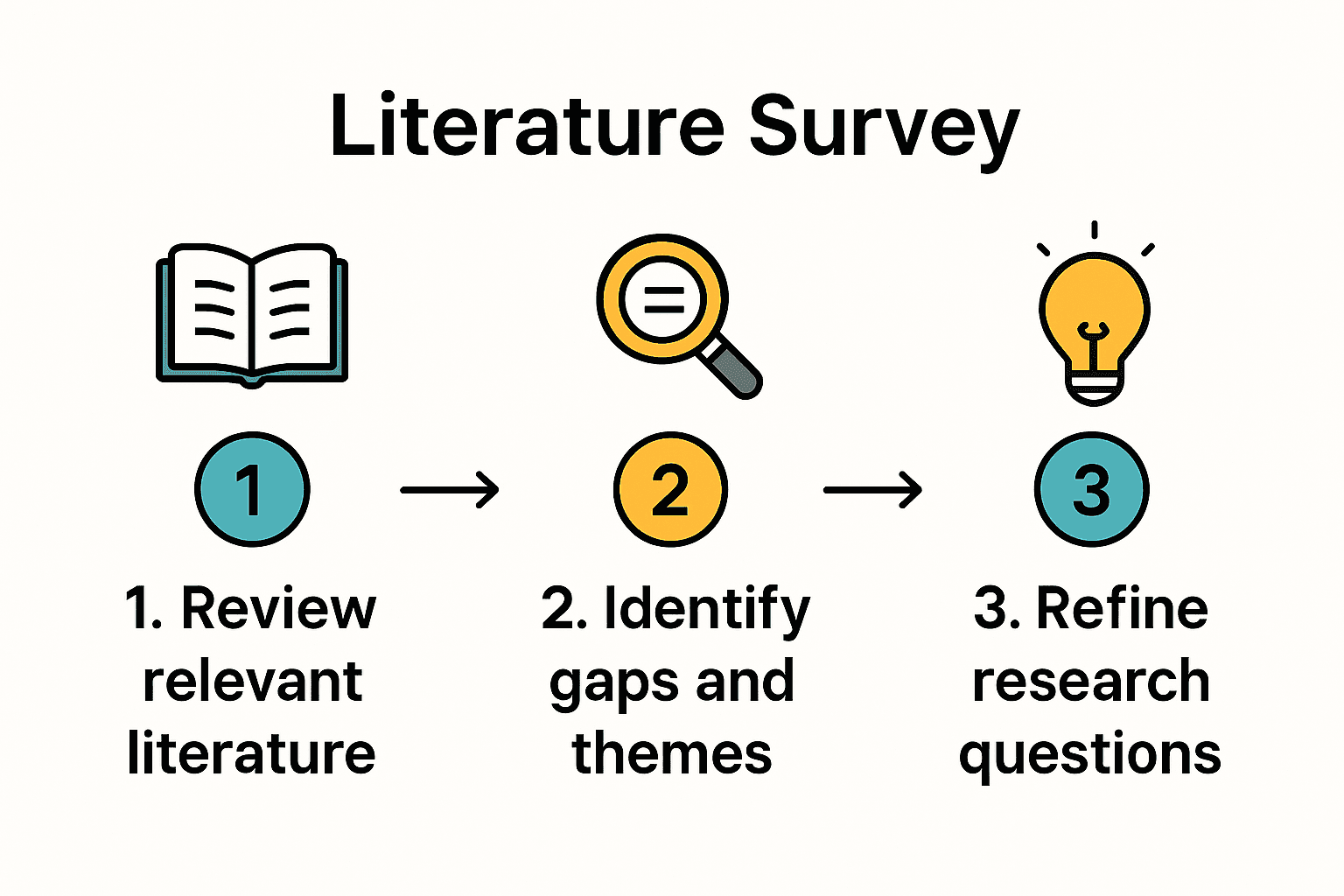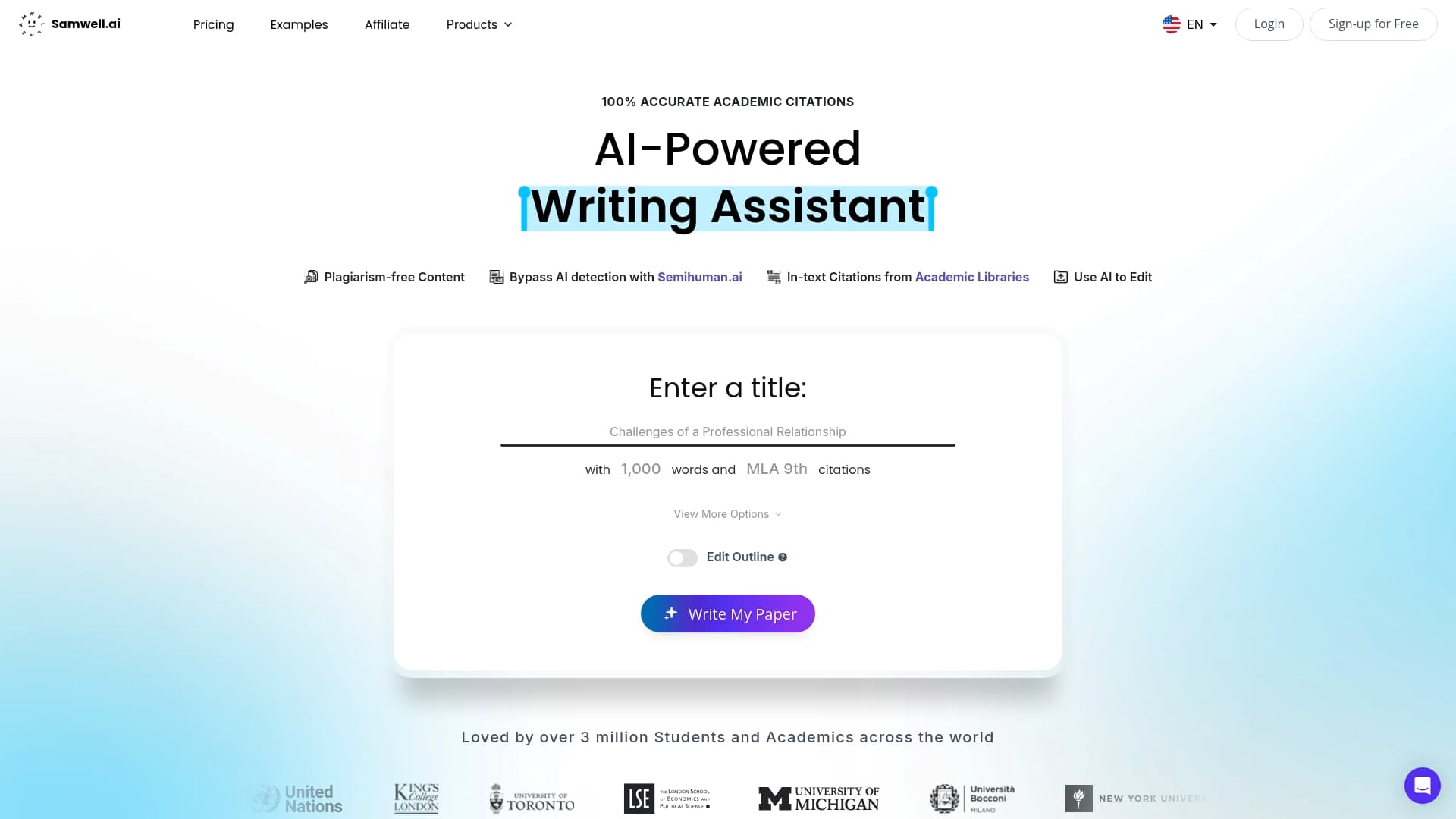Loading...

A strong literature survey lays the groundwork for research that actually moves the field forward. More than 70 percent of successful academic projects cite a strategically structured literature survey as their foundation. Surprised? Most people think the hardest part is finding sources among thousands of articles. The real challenge is mastering the critical skills that turn scattered information into a powerful tool for discovery.
| Takeaway | Explanation |
|---|---|
| Conduct a Strategic Literature Survey | Establish clear research objectives and utilize a systematic search strategy to effectively define your research scope. |
| Evaluate Source Quality | Focus on recent, peer-reviewed sources and critically assess the credibility and methodological rigor of your selected materials. |
| Address Challenges with Objectivity | Minimize bias by acknowledging potential influences, implementing systematic sampling, and documenting source selection transparently. |
| Use Digital Tools Effectively | Leverage advanced reference management and visualization tools to enhance your literature survey's efficiency and depth. |
| Synthesize Findings Cohesively | Organize sources thematically and create a narrative that demonstrates the evolution of understanding in the field, highlighting patterns, contradictions, and research gaps. |
A literature survey serves as a critical foundation for academic research, providing researchers with a comprehensive roadmap to understanding existing knowledge in their field. Unlike a casual review, this systematic approach demands a strategic exploration of scholarly sources that illuminates the current state of research and identifies critical gaps for future investigation.

Researchers approach literature surveys as sophisticated analytical tools that go beyond simple information gathering. Discover advanced research strategies for creating a robust academic foundation. The primary objectives of a literature survey include synthesizing existing research, critically evaluating current knowledge, and establishing a theoretical context for new scholarly work.
At its core, a literature survey accomplishes several crucial academic functions. According to research from the University of Delaware, it helps researchers:
A well-crafted literature survey is not merely a summary of existing research but a critical analysis that demonstrates the researcher's deep understanding of the field. According to Australian National University's research methodology guidelines, the survey serves as an intellectual dialogue that connects past scholarship with potential future investigations.
The process involves more than collecting sources. Researchers must critically analyze each source, identifying patterns, contradictions, and emerging trends. This analytical approach transforms a literature survey from a simple compilation into a sophisticated scholarly instrument that:
Effective literature surveys require meticulous attention to detail and a comprehensive approach. Researchers must carefully select sources, critically evaluate their academic merit, and synthesize information in a manner that reveals deeper insights. By understanding the purpose and executing a thorough literature survey, academics can position their research at the forefront of scholarly innovation, contributing meaningful knowledge to their respective fields.
Conducting an effective literature survey requires a systematic and strategic approach that transforms research from a simple information gathering exercise into a comprehensive scholarly investigation. Learn advanced research techniques to elevate your academic work.
The foundation of a successful literature survey begins with precisely defining your research parameters. According to University of Arizona research guidelines, researchers must articulate a clear research question that guides the entire process. This involves:
Researchers should approach keyword selection strategically. Use synonyms, related terms, and discipline-specific language to ensure a comprehensive search. Academic research methodologies recommend developing a systematic search protocol that maximizes source discovery while maintaining academic rigor.
Beyond initial source collection, East Carolina University's research methodology emphasizes the critical importance of rigorous source evaluation. Researchers must assess each potential source through multiple lenses:
Source selection is not about quantity but quality. Academic databases like Web of Science, JSTOR, and Google Scholar provide robust platforms for finding peer-reviewed research. Prioritize sources that:
The analysis phase requires more than surface-level reading. Researchers must critically synthesize information, identifying connections, contradictions, and emerging patterns within the existing body of research. This approach transforms a literature survey from a simple compilation into a sophisticated scholarly instrument that reveals deeper academic insights.
Successful literature surveys demand patience, analytical skill, and a systematic approach. By meticulously defining research parameters, conducting comprehensive source searches, and critically evaluating academic materials, researchers can create a robust foundation for their scholarly work. The ultimate goal is not just to summarize existing research but to position new academic investigations within a broader, more nuanced understanding of the field.
Conducting a comprehensive literature survey presents researchers with numerous complex challenges that require strategic navigation and sophisticated academic skills. Explore advanced research techniques to overcome these academic hurdles effectively.
Researchers frequently encounter the challenge of information overload in modern academic research. According to research from Scientific Complex Systems, managing the vast volume of available research requires developing robust strategies. The primary challenges include:
Best practices for managing information complexity involve creating a structured approach to source selection. Academic research methodologies recommend developing a systematic protocol that includes:
Research from Terracline Academic Resources highlights the critical challenge of minimizing bias in literature surveys. Researchers must develop strategies to ensure comprehensive and objective analysis:
Objectivity requires a deliberate and transparent approach. This means carefully documenting the rationale behind source selection, critically evaluating sources from multiple perspectives, and avoiding confirmation bias by actively seeking contradictory evidence.
Advanced Academic Research Guidelines emphasize the importance of creating a coherent narrative within a literature survey. Researchers must transform individual sources into a comprehensive and meaningful scholarly dialogue.
Key strategies for effective synthesis include:

Successful literature surveys go beyond simple compilation. They represent a sophisticated academic exercise that requires intellectual rigor, systematic approach, and critical analytical skills. By understanding and addressing these common challenges, researchers can transform their literature survey from a basic review into a powerful scholarly instrument that advances academic knowledge.
The most effective literature surveys are not just collections of sources but intellectual journeys that reveal deeper insights, challenge existing assumptions, and create pathways for innovative research directions.
In the contemporary academic landscape, researchers have access to an unprecedented array of digital tools that can significantly enhance the efficiency and depth of literature surveys. Discover advanced research strategies to leverage cutting-edge technological resources.
Reference management represents a critical component of successful literature surveys. According to research from GitHub educational resources, tools like Zotero have revolutionized how researchers collect, organize, and cite academic sources. Key features of advanced reference management tools include:
Researchers can leverage tools such as:
Here is a comparison table summarizing the main reference management tools mentioned, including key features:
| Tool | Main Features | Platform Type |
|---|---|---|
| Zotero | Open-source, citation management, collaboration | Desktop/Cloud |
| Mendeley | Cloud-based, research organization, sharing | Desktop/Cloud |
| EndNote | Advanced citation & reference management | Desktop/Cloud |
Qubic Research Methodology highlights the importance of advanced visualization tools in modern literature surveys. VOSviewer emerges as a powerful resource for researchers seeking to understand complex academic networks. These tools provide unique capabilities:
Additional visualization tools include:
The following table summarizes the key bibliometric and research visualization tools cited in this section:
| Tool | Main Use | Notable Capabilities |
|---|---|---|
| VOSviewer | Visualizing academic networks | Mapping research, identifying trends |
| CiteSpace | Network visualization for literature | Citation and network mapping |
| Gephi | Network analysis & visualization | Open-source, data exploration |
| CiteNetExplorer | Citation network exploration | Explore citation relationships |
Semantic Scholar's advanced research platform represents the cutting edge of research technology. Academic research methodologies now incorporate AI-driven tools that transform how researchers interact with academic literature:
Notable AI-powered research tools include:
The most effective literature surveys now blend traditional research skills with advanced technological tools. Researchers who master these digital resources can dramatically improve their ability to discover, analyze, and synthesize academic information. By combining systematic research approaches with sophisticated digital tools, academics can create more comprehensive, insightful, and impactful literature surveys that push the boundaries of scholarly investigation.
A literature survey serves as a foundational roadmap for academic research, providing a systematic exploration of existing knowledge, identifying research gaps, and establishing a theoretical context for new studies.
To define the scope, create a clear research question, establish inclusion and exclusion criteria for sources, and develop a list of preliminary keywords related to your topic.
Common challenges include managing information overload, addressing research bias, and effectively synthesizing complex research findings into a coherent narrative.
Several tools can enhance your literature survey, including reference management software like Zotero and Mendeley, bibliometric and visualization tools like VOSviewer, and AI-powered research assistants like Semantic Scholar.
Are you struggling to organize an overload of academic sources, synthesize complex data, or ensure your literature survey is both original and credible? The article highlighted how critical it is to move beyond simple collection and toward deep synthesis and transparent methodology. Many researchers face these same pain points as they attempt to manage source selection, prevent bias, and curate a literature survey that truly stands out.

Imagine being able to streamline every aspect of your research process with intelligent assistance. At Samwell.ai, you can use advanced AI tools to generate, structure, and edit your academic papers—all while maintaining integrity through built-in plagiarism minimization and real-time AI detection checks. Our platform aligns with top citation standards, making it effortless to follow the best practices discussed in the article. Join over a million academics who already trust Samwell.ai and access features like the Power Editor and Guided Essays for unmatched control and efficiency. Take action now to make your next literature survey your strongest yet. Visit Samwell.ai to see how easy it is to transform research challenges into research success.



